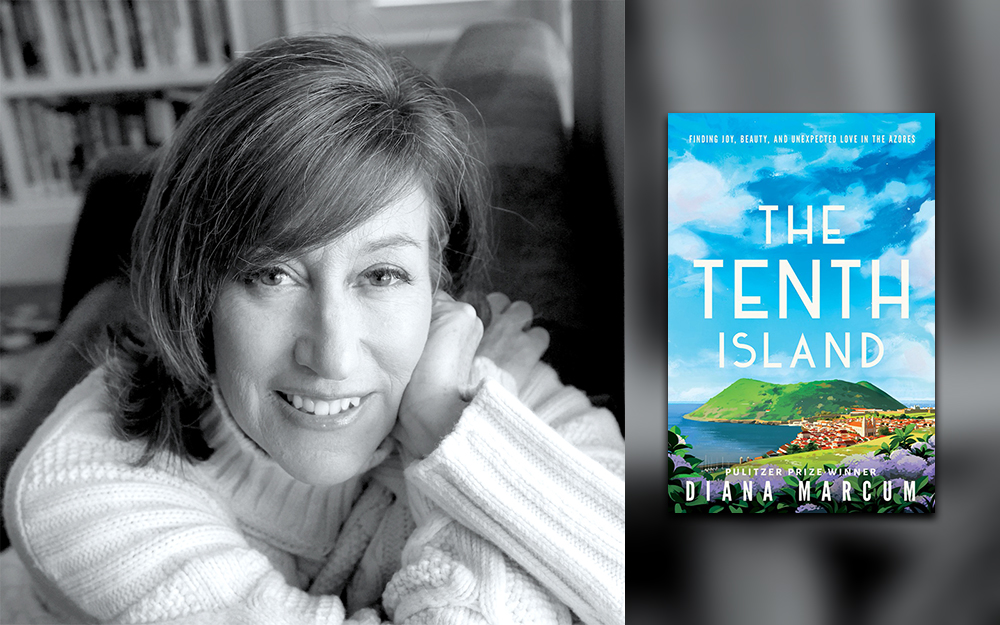
By Heidi Simmons
—–
The Tenth Island
by Diana Marcum – Nonfiction
—–
Being American most often means you have roots from somewhere else. We are blessed to live in such a wonderfully diverse country where we are free to go home or visit ancestral lands. Diana Marcum’s The Tenth Island: Finding Joy, Beauty and Unexpected Love in the Azores (Little A, 240 pages) discovers a hidden world and what it means to be home.
Author Marcum is a Pulitzer Prize winning journalist. While working for the Los Angeles Times, she won the prestigious award for her narrative stories about the effects of the California drought on agricultural communities.
As a feature writer based in Sacramento, Marcum begins her story when she comes across a group of immigrant farmers in California’s Central Valley who work the land like their ancestors. One farmer used trained bulls and a wagon to plow his fields. She finds it is a close-knit community of Portuguese people who have come from the Azores and continue to celebrate its traditions.
After writing her story, Marcum is invited to a festival where she is completely smitten by the friendly people and their colorful culture. With the encouragement of her new Azorean friends, Marcum visits the north Atlantic archipelago and finds herself charmed by the land, the history and the community.
After her short visit, Marcum returns to work and finds herself in a journalistic stupor and with relationship troubles. Years later, she wins the big prize but still cannot find love.
But when the newspaper must lay off journalists, she willingly takes the payout to go back to the islands where, with her dog Murphy, she hopes to understand the indefinable Portuguese word “saudade” and maybe love as well.
For a word that has no definition, saudade (from what I get of the book) is a longing for home and the sense of belonging, which seems to closely reflect the author’s own personal desire. Marcum’s parents both passed away while she was still a teenager and she is eager to be a part of an embracing, closely related family, with deep cultural origins.
This subtle drive makes Marcum a lovable and sympathetic protagonist in her own story. Although this is not a memoir, she shares her personal and intimate life of being lonely and wanting to fit in.
Make no mistake, the Azores and Azorean culture are the focus of Marcum’s book and she shares the magical place and its people with a great fondness. She stays on the island of Terceira and makes trips to some of the other islands that include Sao Miguel and Faial. The island world seems without trouble and crime and is incredibly welcoming and accepting of the visiting “American Girl.” I wondered if she was treated differently – better perhaps — because of being an award-winning journalist. News spreads fast on a small island.
Marcum includes the islands’ history and writes that the United States has the largest population of Portuguese immigrants who came in two waves, first fleeing fascism, and the second, a volcanic eruption.
Many of the immigrant families’ still own their ancestral homes and travel back every year. Their American born children often meet and marry on the islands. Some decide to stay.
Marcum does a beautiful job describing the lush islands and quaint life of the Azores — a legitimate paradise with moderate, yearly temperatures due to the influence of the warm Gulf Stream that passes through the archipelago. The unique biome has green pastures, lavender hedgerows of hydrangeas, rain forests, rare animals, birds and insects, and caldera lakes filled fresh water.
I enjoyed the glimpse into Marcum’s life and the heavenly Azorean world. In the preface, she admits years later, to putting her notes aside and writing from memory, which adds to the charm and delight of her colorful and insightful creative nonfiction narrative.
The book’s cover is inviting and captures the feel of Marcum’s travelogue. The title serves as the lesson she most needed to learn.
Where the Azores consist of nine islands, one of her island friends tells her: “The tenth island is what you carry inside you. It is what’s left when everything else falls away. Those of us who live between worlds just know the Tenth Island better.” He concludes: “No matter where I have lived—I have never left my island.”










































